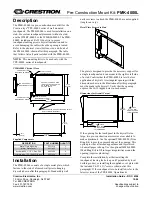
2
3
Oxford Silver paddock stands OX281 and OX282
PADDOCK STAND FITTING INSTRUCTIONS (Front or Rear Stand)
These stands are designed to support the weight of most motorcycles up to 250kgs, but will not support the
additional weight of a rider sitting on the machine while on the stands.
Oxford Products Limited accept no liability arising from the incorrect use, assembly or use for any other
purpose than that which it is designed for. Do not allow children to use these paddock stands.
Please assemble the paddock stand in accordance with the diagram below. The bolts and nuts (M8x55) that
pass through the frame tubes should be tightened sufficiently to ensure that the upright arm/tube cannot
twist in the handle tube. We would suggest a torque setting of 42 to 44Nm or 30 to 32 lbs/ft² as a guide. Do
not over tighten.
If for any reason you are unable to get a tight fitting that ensures the upright tubes do not rotate in the
handle tube, please do not use the stand and call your local dealer for advice.
If you have any questions regarding your Motorcycle Paddock Stand, please contact your local retailer.
REAR PADDOCK STAND for use on motorcycles with 17” wheel rims
Important:
1. It is a 2-man operation to raise and lower the motorcycle using this stand.
2. THE STAND IS ONLY TO BE USED ON A FIRM, SMOOTH AND LEVEL SURFACE.
3. Please note that this stand comes with 2 different lifting arms to suit most motorcycles
a. For swing-arms which are of a straight and flat shape, use the L-shaped cups which have
the black plastic protective covering. With this fitting method, this stand is suited to swing-arms
which are between 28cm to 35cm wide (11” to 13
3
/
4
”)
b. For swing-arms which are cast into a curved shape it is necessary to fit bobbins to the
motorcycle and use the metal pickup forks. With this fitting method, this stand is suited to
swing-arms which are between 30.5cm to 37.2cm wide (12” to 14
5
/
8
”)
-
If you are using the L-cups, position the rubber lined channels of the L-cups correctly under the
swinging arm ensuring that no cables or brake lines are in the way.
-
If you are using the forks to attach to the bobbins which are mounted onto the motorcycle, position
these forks so that the fork is in the centre of each bobbin and ensure that the metal fork will not
scratch the swing-arm when the stand is lifted.
-
When the position of the forks or L-cups is correct and central within the stand, tighten the lateral
adjusters (M8 x 12mm) before lifting the motorcycle off the ground.
There are now
two
lateral adjusters at the top of each upright tube of the stand. It is only necessary
to use 1 per leg however the use of 2 will ensure a more secure fitment.
If there is clearance above the paddock stand, then it is possible to use the adjuster screw (a) on the
top of each leg. This is positioned on the outer edge and is designed to ensure that the lifting arm
remains horizontal when under load.
(NEVER POSITION THE L-CUP or FORK EDGES UNDERNEATH THE SWING-ARM)
FRONT PADDOCK STAND for use on motorcycles with 17” wheel rims
Important: -
1. The front stand
must be used in conjunction
with a rear stand - it is a two man operation
to safely raise and lower the motorcycle using these stands. The rear stand must have lifted
the motorcycle BEFORE the front stand is fitted and make sure the motorcycle is stable and
secure.
2. THE STAND IS ONLY TO BE USED ON A FIRM, SMOOTH AND LEVEL SURFACE.
3. This stand is not ideal for all motorcycles, especially where the brake caliper extends from the
lower part of the front fork (radial brakes)
Note:
- before lifting the motorcycle it may be necessary to remove the front mudguard to allow
the front wheel to be removed and also if necessary loosen the wheel spindle fixings.
Designed to suit fork leg overall widths of 26cm (10 ¼”) or less. Not suitable for small diameter
fork legs or those without flat fork bases.
Check there are no obstructions at the rear of the fork legs that prevent the rear pin(B) assuming
the normal lifting position (i.e. brake caliper casting or speedo drive.)
One lifting pin(A) should be placed underneath the motorcycle front fork and the other pin(B)
resting behind the fork (the side facing to the rear of the motorcycle).
Push down on the handle and raise the front wheel off the ground. The over-centre action will
pull the handle to the ground. Re-check the pin location and the stability of the motorcycle on
both stands.
Do not leave the machine unattended with the front end raised off the ground.
Do not turn the handlebars while the machine is on the stand otherwise the bike may fall off the
stand.
Handle
tube
Pin (A) Pin (B)
Pin (B)
Pin (A)
Lifting
arms
Upright tube
Spare Codes
OF822F Front Stand Lifting Forks (Pair)
For Bobbin Fitting Chart visit:
www.oxprod.com/bobbins or
scan QR code
3
GB
GB

































